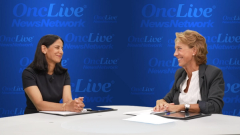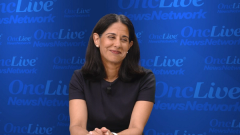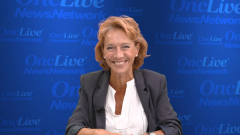
Treatment for HR+ Metastatic Breast Cancer After Progression on CDK4/6 Inhibitors
Shared insight on appropriate treatment options for patients with HR+ metastatic breast cancer following progression on CDK4/6 inhibitors.
Episodes in this series

Transcript:
Sara M. Tolaney, MD, MPH: We are talking about what to do with a patient who progresses after a CDK4/6 inhibitor. In a very select patient, you may be able to continue a CDK4/6 inhibitor, but what about other more standard strategies? For example, are you testing patients for acquiring ESR1 or PI3 kinase mutations? What do you think about utilization of alpelisib here?
Eva M. Ciruelos Gil, MD, PhD:Excellent question. I don’t think ESR1 has been recommended to be routinely tested by medical societies, but as soon as we have these new data inserts, we should be able to begin testing our patients routinely, especially in the post-CDK scenario when they’ve been pretreated with an aromatase inhibitor. They are gaining probability of having an ESR1 mutation. This is not done routinely in the clinics, but maybe it should be, or we should start. PIK3CA must be routinely screened for, if the patient is metastatic, maybe before or after the first line because the impact on the status of PIK3CA won’t affect the decision nor the efficacy on CDK inhibitors but could affect decisions on the second line. So if a patient has a PIK3CA mutation, she should be treated with alpelisib now plus a different hormonal combination; it could be fulvestrant per the SOLAR trial, or it could be letrozole per the BYLieve Cohort B trial. Thanks to BYLieve, we have many potential drugs, with some nice efficacy and toxicity data, to combine with alpelisib. BYLieve seemed to not be a positive trial, but at that time, we didn’t realize the difficulties in the post-CDK case scenario. If you have 5 months of progression-free survival [PFS] after CDKs, these are good data, so BYLieve is a positive trial. We’ve realized that after seeing SERDS [selective estrogen receptor downregulators], VERONICA, and other trials that specifically test second-line treatments after CDK4/6 inhibitors.
At least for me, I wouldn’t recommend treating unmutated patients with a hormonal therapy alone because median progression-free survival is around 2 to 3 months. This is very poor. I would need to offer some new combinations, preferably on a clinical trial. Going back to everolimus, everolimus has data from a phase 3 trial with exemestane, BOLERO-2, from phase 2 trials with fulvestrant in the…and MANTA trials, and also with tamoxifen in the TAMRAD trial. We have all of these possibilities to combine everolimus in this post-CDK scenario in unmutated patients. These would be my recommendations unless there are other clinical trials that would benefit these patients. The evERA trial will combine a new SERD with everolimus. This may be a very good option, for SERDS to be combined, after palbociclib or what you mentioned before.
Sara M. Tolaney, MD, MPH: I agree with you. I generally like using combination therapy post-progression on CDK.
Eva M. Ciruelos Gil, MD, PhD: Sure.
Sara M. Tolaney, MD, MPH: This is because the PFS with endocrine monotherapy is so poor. I think your algorithm is really helpful, to think about testing for PI3 kinase mutations, using alpelisib there; if there isn’t a mutation, thinking about an everolimus combination.
Eva M. Ciruelos Gil, MD, PhD: It’s been a pity to not have more possibilities for using these targeted drugs against the PIK3/Akt/mTOR or PTEN signaling pathway. It was a negative trial, after some positive results in patients in which this pathway is altered. There are still some pending trials on capivasertib. Maybe we should revisit how we selected patients in those trials, as in the triple-negative scenario, if you test the whole pathway, you are able to capture more patients and turn a negative trial into a positive trial, as seen at the last ASCO [American Society of Clinical Oncology] meeting. I don’t know if there’s still a role for some type of Akt inhibitors, as well as complementary drugs to be combined with our mono treatments in the second- and third-line scenario. That should be welcomed.
Sara M. Tolaney, MD, MPH: No, I think it was quite impressive, when they were able to capture all of the pathway alterations, the benefit in terms of PFS and OS [overall survival] was quite striking. We’ll wait to see the phase 3 data to see if there will be a role for Akt inhibition in this space.
Eva M. Ciruelos Gil, MD, PhD: Sure.
Sara M. Tolaney, MD, MPH: It is nice to think about these different scenarios.
Transcript edited for clarity.









































